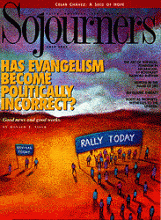There is a kind of writer appearing with greater and greater frequency among us who witnesses the crimes of his government against himself and his countrymen....His is the university of the imprisoned, the tortured, the disfigured, and the doleful authority for the truth of his work is usually his own body.
- E.L. Doctorow
From time to time, debate arises in First World poetic circles as to whether "politics" is a fitting subject for poetry. The absurdity of cordoning off parts of human experience, labeling them "political," and discouraging poets from writing about them is made refreshingly clear in these four collections. Who would dare tell a writer like Alicia Partnoy, disappeared by the Argentine military, or Luis J. Rodríguez, raised in poverty in Watts, not to touch on "politics" in their poems?
"Political" is often a label created by critics to distance themselves from realities they aren't immediately affected by and would rather not think about. Thus it is considered acceptable for a poet to write about a child down the street killed by an abusive parent, but "political" if the same poet writes about a child in El Salvador killed by the death squads.
Writers like Rodríguez and Partnoy make clear that the terms "personal" and "political" become meaningless once we look beyond a small circle of North American poets. Rather than branding poets who describe injustice "political," many critics have begun to call these writers what they are: witnesses.
Read the Full Article

